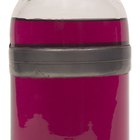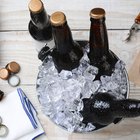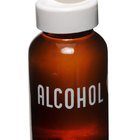
The subtle flavor of beer in bratwurst is a summertime staple for the grill. Whether you boil them yourself or buy prepackaged beer brats, you don't have to worry that you’ll be stumbling around the lawn in a drunken stupor after devouring a brat sandwich. Although a trace of alcohol will likely be present, beer-boiled bratwurst won’t leave you with a hangover after a hard night of eating.
Alcohol Retention
It’s a common misconception that heat cooks all alcohol out of food, but the amount of alcohol retained during the cooking process of any food depends on the method of preparation coupled with cooking time, according to a study conducted by the U.S. Department of Agriculture’s Nutrient Data Laboratory. For example, the study revealed that alcohol stirred into a mixture and baked or simmered for 30 minutes retained about 30 percent of the alcohol. The retention diminished the longer the food was cooked. The highest rate of alcohol retention -- 85 percent -- was discovered after adding a spirit to boiling liquid and then removing it from the heat before serving.
Beer-Boiled Bratwurst
Of course, it’s likely you’re not going to consume the beer in which you boil your bratwurst. The beer in a boiled bratwurst is essentially to enhance the flavor of the meat. Unlike hard liquor, beer has a much lower alcohol content, with most domestic beers containing an average of 5 percent alcohol. The boiling process does cause some of the beer’s alcohol content to evaporate as alcohol has a lower boiling point -- 173 degrees Fahrenheit, as opposed to the 212 degrees F at which water boils. Even so, the cooking process doesn’t remove the alcohol entirely, although the amount of alcohol is less than cooking something such as a flaming, alcohol-soaked flambe. Of course, the longer you simmer the brats, the less alcohol will remain.
Safe Handling
Handle all fresh sausage properly; if you don’t, the alcohol content in beer-boiled bratwurst may be the least of your worries. Purchase only the freshest bratwurst and ensure it is properly refrigerated. Fresh sausage should be stored in the refrigerator only one to two days before cooking, according to the USDA.
Inform the Host
If you’ve had issues with alcohol or you’re averse to eating bratwurst boiled in beer, inform your host a day or two in advance of the meal. Alternatively, in a restaurant setting, inquire as to whether the chef can prepare the dish without alcohol. If not, opt for another item on the menu.
Related Articles

Is it Safe to Cook With Beer?

Does Alcohol in Beer Cook out in the ...

How Long Does It Take Alcohol to Cook ...

Does Beer Batter Contain Alcohol?

Alcohol Content of Cooking Sherry

What Happens to the Alcohol ...

German Beer Vs. American Beer

How to Cook Deer Brats

Does Alcohol Cook Out of Baked Goods?

Can I Use Sherry Instead of Red Wine in ...

How to Cook Raw Pork Bratwurst Sausage

How to Steam Cook Bratwurst

How Much Is a Single Serving Size of a ...

What Kind of Alcohol Is Good to Cook ...

How to Store Rubbing Alcohol

How to Soak Brats in Beer
The Calories of Pacifico Beer

What Are the Dangers of Cooking With ...

Does Brandy Freeze?

How to Cook With a Brinkmann Barrel ...
References
Resources
- Journal of the American Dietetic Association and USDA Table of Nutrient Retention Factors; Augustin J, Augustin
Writer Bio
Lisa Swickard began her writing career in 1982. She is the owner of Virgin Alley Press, an Ohio-based publishing company. Swickard is an award-winning author who recently released her ninth book. She also is a writer/editor for Tiffin University. Swickard has a journalism degree from Bowling Green State University.
Photo Credits
Jupiterimages/liquidlibrary/Getty Images